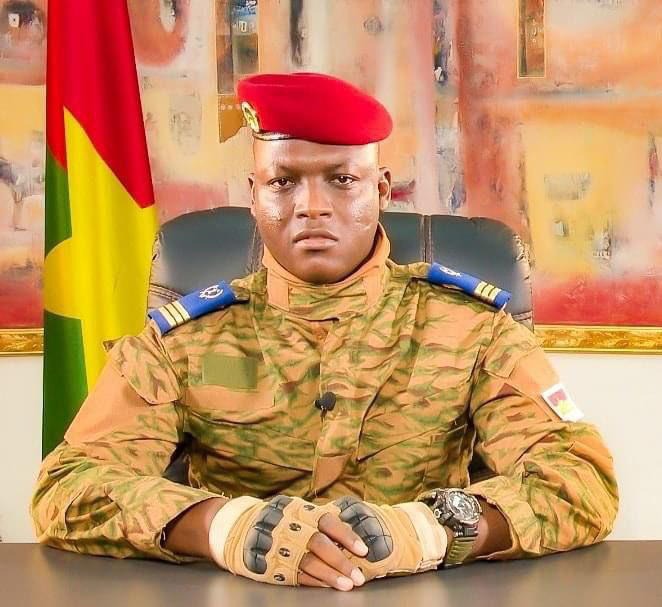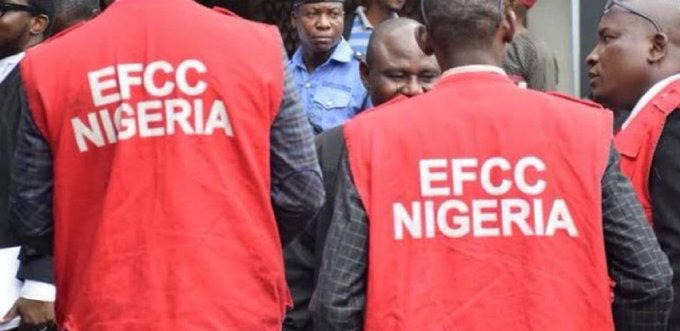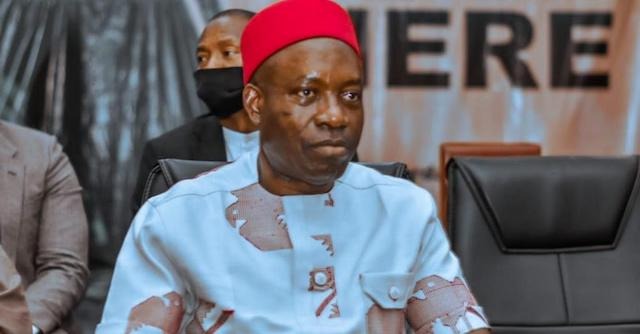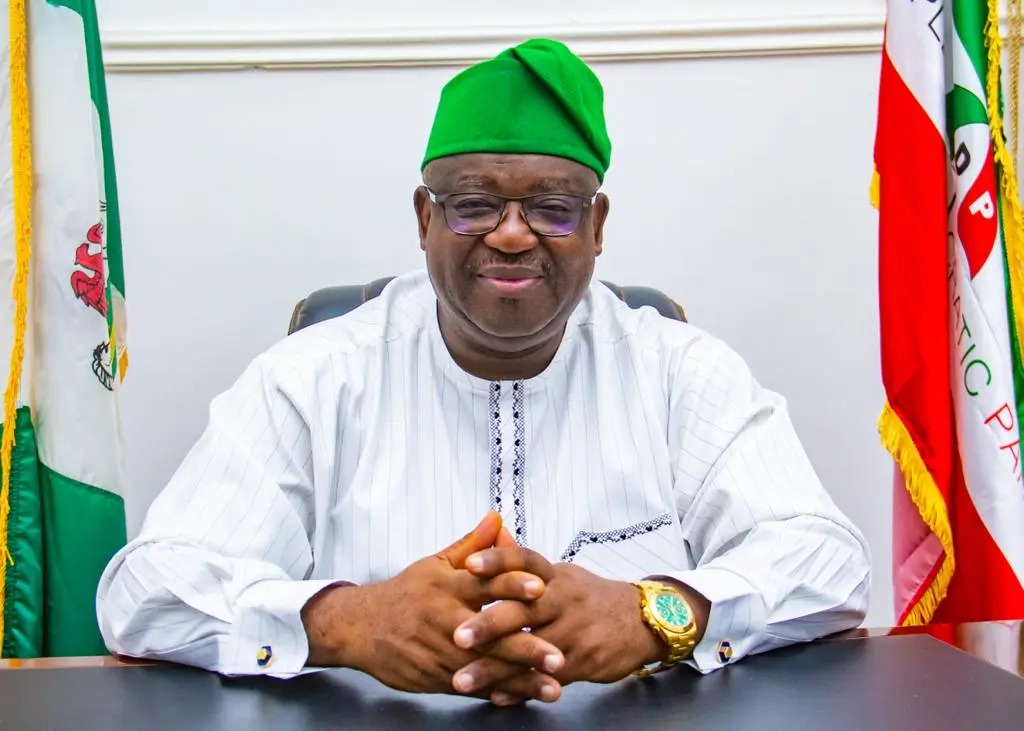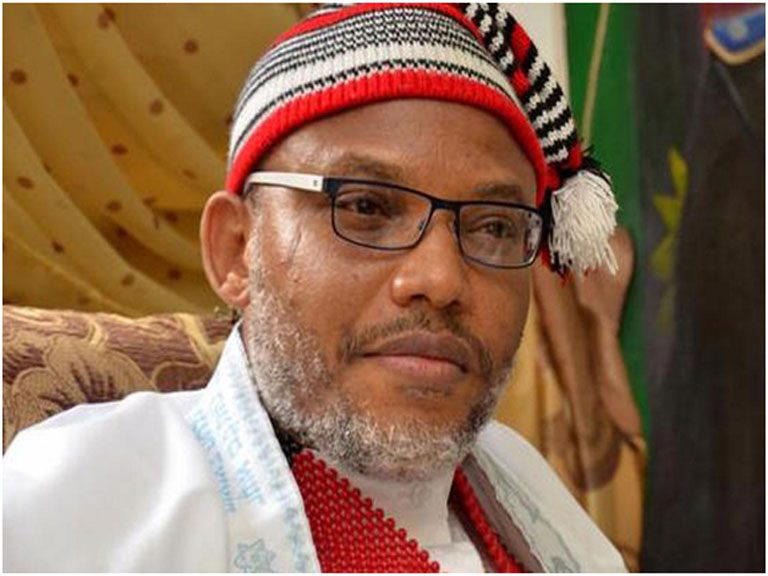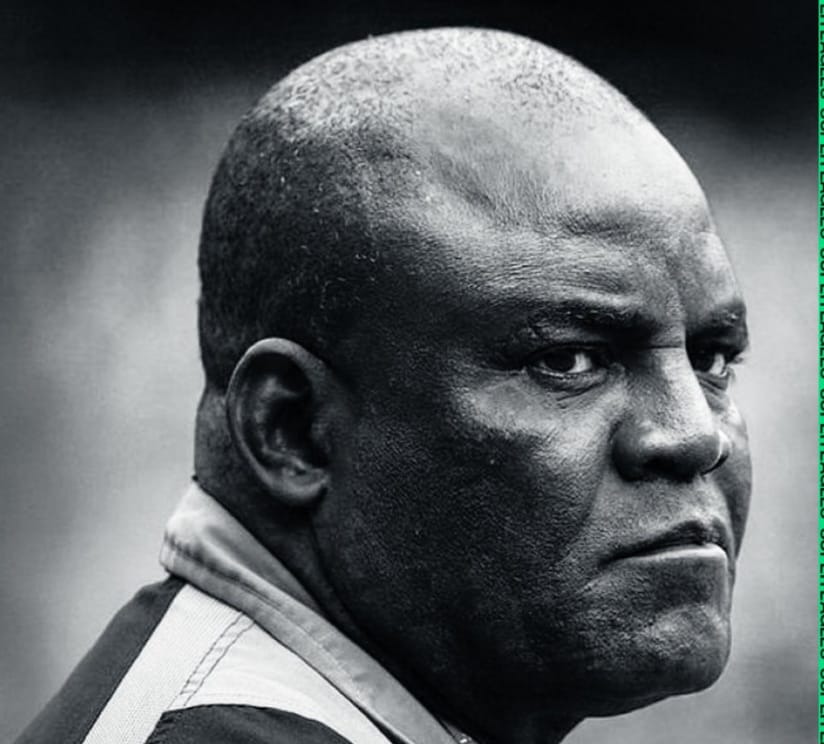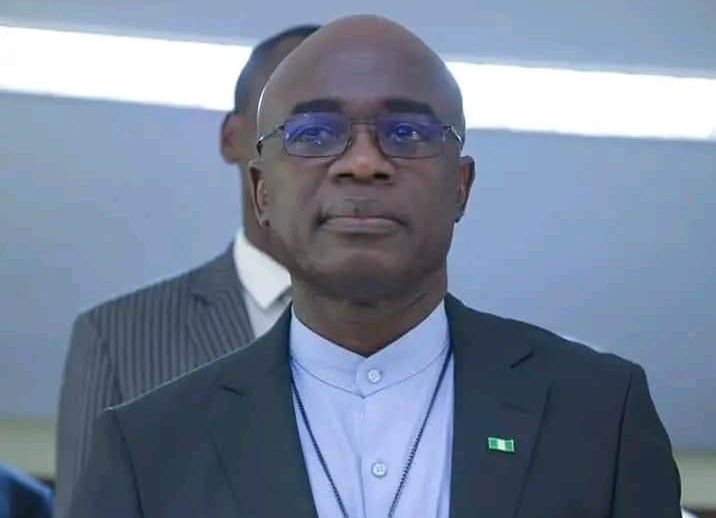Prof. Dele Jegede is a Nigerian-American painter, art historian, cartoonist, curator, art critic, art administrator and teacher.
He was born 1945 in Ikere-Ekiti, Ekiti State, Nigeria. Jegede earned his first degree in Fine Arts (with First Class Hons, majoring in Painting) from the Ahmadu Bello University, Zaria, Nigeria, in 1973.
From 1979 to 1983, he studied art history under Roy Sieber at Indiana University, Bloomington, Indiana, where he received his MA and PhD degrees. He was a Senior Post-Doctoral Fellow at the Smithsonian Institution in Washington, DC, (1995). He taught at Spelman College, Atlanta as Visiting Fulbright Scholar (1987–1988), when he curated the exhibition, ‘Art by Metamorphosis’.
Listed in Kelly and Stanley’s “Nigerian Artists: A Who’s Who & Bibliography”, Jegede was Professor and Chair of the Department of Art, Indiana State University, Terre Haute (2002–2005) and Professor of Art at Miami University in Oxford, Ohio (2005–2010). He retired as Professor Emeritus in May 2015.
Prof. Jegede is recipient of the Distinguished Africanist Award of the University of Texas. He is currently the Chairman, board of trustees of the Cartoonists Association of Nigeria (CARTAN).
In this interview to celebrate his 80th birthday, Prof Jegede speaks with OSA MBONU-AMADI on broad issues pertaining to his art, philosophy and career as an artist and academic:
Everyone prays to live long, but nobody likes old age. At 80, do you feel such conflicting desires? What philosophy have you for resolution of such conflict?
Permit me to question the premise of your question. The notion that everyone prays to live long remains just that: a prayer, which is not often granted to all supplicants. Similarly, the thesis that nobody likes old age is contentious. I for one do. Never mind that your legs may not always agree with your body’s plans on occasions. And senior moments—those occasions when you must jolt your temporarily frozen brain into action—may become more frequent. Paradoxical as it may be, living and dying are two parts of the same coin. They constitute the dualism of existence. All humans are designed to, and certainly will, die at some point. This is part of the cycle of life, from the cradle to the grave. Thus, when you analyze things critically, you’ll find no conflict. While many may pray to live long, not everybody will. Most cultures in Africa ascribe wisdom to old age. Most cultures revere old age and accord respect to the elderly. But these cultures also accommodate the inevitability of premature death. So, inexorably, the beginning is joined to the end of this cycle. The renowned poet, T. S. Eliot, simplifies all I’ve been laboring to say in one of his poems, “In my beginning is my end.”
Unfortunately, it is beyond my capacity as a mere mortal to propose ways to resolve this paradox. And I doubt that anyone has a solution to such an existential dichotomy. What we should be concerned with is the quality of life that is our lot. Why, for example, is Nigeria still mired in the quagmire of poverty more than two generations after independence? Why do our growth indices continue to decline? Life expectancy in Nigeria today is a mere 55 years, nearly ten years below the African average. Successive administrations in Nigeria since independence have yet to find the right blend of democratic panacea for the assortment of ailments sickening the nation. Nigerian politicians (bless their wily, mischievous, and gluttonous hearts) seem to specialize in conjuring the most septic form of government for its people. In the Second Republic, did they not travel abroad to find solutions to—ahem—mosquito infestations in their domains? Ultimately, they realized that it was much easier and much more profitable to their deep pockets to bring Americana to Nigeria: why not run the American presidential system? There! We imported the frills and fanfare of Americanism but circumvented its ethos and disciplinary tropes. Instead of solid guardrails to promote honesty and integrity, and disincentivize corruption, we installed spurious flails. We even invented fallacious “doctrines”—of necessity, immunity, and imperviousness—to boot. The results today are unmistakable. All you need do is check EFCC’s list of former governors and political operatives whose cases are still pending. The bone tied around the political dog is no longer a forbidden meal; the dog has procured the services of other dogs and they have found a way to crack and savor the proverbial bone.
Every artist has thematic preoccupation – a recurring or central theme or set of themes the artist consistently focuses on or is deeply concerned with in his work. What would you say is your thematic preoccupation as an artist?
Conscientious artists are driven by their internal clocks and muses. There is an impulsiveness to continue honing their craft. Observers or critics may perceive a thematic strain in the oeuvre of such artists over time. But this does not mean that the artists began with a slate of specious themes or hackneyed memes. This is not to deny that through introspection and research, artists do come up with themes that best represent their creative guts. Oftentimes, though, it is an artist’s style and idiosyncrasies that serve as unmistakable gestures synonymizing such an artist. Here are a few examples. For those who are familiar with her, the work of Nike Okundaye instantly brings up fields of blue àdìrẹ with geometric patterns. At the mention of Bruce Onobrakpeya, your mind’s eye shifts to bedazzling prints and bas-relief installations. With this formula, you can try figuring out what impressions are invoked by the works of Yusuf Grillo or Kolade Oshinowo, for example. Try to extend this to Van Gogh. And Picasso. Alberto Giacometti. You got the drift. In all these instances, it is not the theme or subject matter, but the style, that represents the artists. This formula also holds up when applied to music. A Sunny Ade; an Ebenezer Obey; a Fela Anikulapo-Kuti; a Davido; Miles Davis; Herb Alpert; Louis Armstrong: name them. Once you are familiar with the work or music of an artist, you will most likely figure them out even if you have never seen or heard the work. That is style for you.
So, by way of answering your question about my thematic preoccupation as an artist, I provided you with the code and principles that you could apply to my work as a painter. Now, let me give you the last clue to the code: familiarity. All this matters only if you are familiar with the works of the artists under consideration.
In a recent interview, you spoke about the Chibok Girls imbroglio, Boko Haram, and Internally Displaced Persons in Nigeria, which are some of the issues you addressed in your 2016 solo exhibition at Terra Kulture. Those of us who still live in Nigeria know that 2016 Nigeria is far better than the Nigeria of today. At 80, have you retired from addressing the problems of your homeland through art, even at a time you’re needed most?
The simple answer here is no. The artist fails the percipience test who refuses to commit his or her art to a purpose. Art is a vehicle. What’s your destination? What do you communicate with it?
You also spoke about your recent body of thematized work that deals with protestations triggered by the murder of George Floyd in 2020. That was during the first coming of Donald Trump, and we all know Trump’s attitude towards the murder of Floyd and the Black Lives Matter protests. On January 6, 2021, Trump facilitated an insurrection in the U.S that almost ditched democracy. Could you have imagined then that Trump would be returned to power by Americans, and how are you responding to this development with your art?
Your question reminds me of the quaint saying credited to the famous American baseball player, Yogi Berra: “The future ain’t what it used to be.” As recently as a decade ago, civility and deference were a normative component of politicking in the U.S. The proclivity to reject election results even before any ballots were cast (which is the specialty of the Nigerian political class) was a rare feature in the American electoral process. When we cast our ballots during the 2000 election cycle, we were optimistic that our candidate, Al Gore, would be the next president. The Supreme Court ruled otherwise and Al Gore conceded, all within five weeks. And the nation’s interrupted programs resumed; things went on as usual. A memorable moment that highlighted the spirited competitiveness in American politics came during the McCain-Obama campaign in 2008 when McCain had to defend the identity and integrity of Obama by telling an ill-informed supporter during a campaign stop that Obama was not an Arab. Parenthetically, American campaigns never fail to throw up hordes of nincompoops. Somebody wearing a red MAGA hat might be quick to tell you to “go back to where you came from.” The only problem is that you are from the American state called Hawaii, which the T-shirt you are wearing is celebrating. But poor Karen, she has no idea where Hawaii is, or what its flag looks like. So, she concludes that you must be an “illegal alien.”
Politically, the Obama era represented the American future that Yogi Berra lamented. The incursion of Trump into the political arena in 2016 marked the beginning of a new, disruptive strain of politics in America, the like of which left rational human beings, regardless of party affiliation, flummoxed. For Democrats, in particular, Trump’s first coming was traumatic. All you needed to know about the character of the new president-to-be—crudity, sauciness, misogyny, vulgarity, irreverence, braggadocio, and unprecedented brazenness at fabricating lies and peddling falsehood—all this and more was on display during his debate with Hilary Clinton. Yet, he won. And no one went to court. Clinton conceded. But when Trump lost his re-election bid in 2020, he took the nation to the pits of hell, culminating in the January 6, 2021 assault on the Capitol, an unmistakable coup attempt.
How, then, did Americans decide to bring him back for what promises to be a much more grandiose rehash of Trump 1.0? That is the ugliness of democracy. Fool me once, shame on you; fool me twice, shame on me. That is the case with America. Those who think democracy is without its pangs and national hemorrhaging should ask the thousands of federal workers who Trump summarily fired; they should talk to the leadership of universities whose federal funding has been canceled. How about USAID, Gaza, Greenland, Diversity, Equity, and Inclusion (DEI), which has become the bugbear of the new administration’s unhidden racism? Ah! I almost forgot the new buzzword in the global arena: tariff! While he did not cause it, his handling of COVID-19 during his first presidency highlighted the degree of prebendal political gamesmanship that Trump personifies. Here was a person who never missed a chance to stoke the fractured lines of hate and national acrimony.
As an artist, these are the putrid streams that I have aestheticized. After my 2016 exhibition at Terra Kulture in Lagos, I determined that although Nigeria will never cease to excite my imagination as a conscientious artist, I have more than enough in my locale to animate my canvases. From the daylight murder of George Floyd in Minnesota and the sprawling throngs of protesters on public squares, streets, and intersections, to the January 6, 2021 attack on lawmakers by Trump’s MAGA crowd, there is a surfeit of incidents and events clamoring to be memorialized in my art.
Prof Sir, would it be correct to interpret as abstract paintings, your statement that ‘currently, (you’re) fixated on non-figurative aesthetics: exploring the properties of color to create non-particularistic images that inspire hope’?
Yes, indeed. An abstract art, regardless of the medium—sculpture, painting, photography, print, textiles, ceramics, photography, or the materials deployed in producing these, be they oil, acrylic, watercolor, and others—is an art that does not represent reality. Abstract art is also known as non-objective, non-representational, or non-figurative. All of this simply means that such an art may be a deliberate visual distortion of known reality or work that is fully independent of any objective reality.
Digital art and the advent of Artificial Intelligence have revolutionized creativity and caused a lot of disruptions and concerns in the world today as well as amongst artists. What future do you think conventional artists like you have amid these disruptive technologies — AI and digital art?
I can say here that concerning the rumored disruptions that AI will unleash on art, I have seen the future of art, and it is bright. Let’s put it this way: technology and art have always had this coquettish relationship. It is a relationship that has also provoked a mixture of adversarial and celebratory reactions in equal measure among their supporters. But in the end, the relationship between art and technology has historically turned out to be beneficial for humanity. The operational word here is adaptation. Remember when photography first made its debut in mid-19th century France? Well, it provoked uncomplimentary reactions from some artists of the time, particularly painters, who believed that photography posed an unwelcome challenge. But it was Felix Nadar, a cartoonist, who embraced the new art of photography and elevated it to commanding heights (pun intended) in society. Today, everybody who has a functional phone—the Agege bread seller, the vulcanizer, your newspaper vendor, the okada rider, even your Bar Beach pastor (God is Good), and NEPA operator among others—is a photographer. The ubiquitousness of technology is so pervasive it is almost total. Have you ever left your phone unattended with your toddler? Perhaps you have come across that dog on social media who struts for the camera? With the capacity to adapt and re-contextualize, AI will become a handy item in the tool kit of artists.
We read of the many things you said you miss about your homeland, Nigeria. It made me begin to reflect on something the wife of the late Prof Isidore Okpewho told me in an interview when her husband passed on. Out of anger against the state of affairs in Nigeria created by the leaders, Prof Okpewho, while he was alive, instructed his family never to take his body home to Nigeria in the event of his death. Sir, are you ever gonna go home?
In the metaphorical sense of going home, of course, I would. Eventually. Everyone does. The more pertinent question is, where is home? The popular maxim intuits home as where the heart is. In that sense, I have no quibbles about home being where I have my family: a place where I have lived for more than three decades now.
You gave painting and writing as the things you enjoy doing most, and I’ve had a taste of your elevated prose from your recent press interviews. What books have you written outside your academic writings? If there is, could you please give us a synopsis of the book. What is the book, “The world moves, we follow”, attributed to you, about?
The books that I have written are mainly scholarly books dealing with my area of academic specialty, which is African art from ancient artifacts to contemporary manifestations. In 2009, my book, Encyclopedia of African American Artists was published. In 2014, the definitive book on the work of the preeminent Nigerian printmaker, Bruce Onobrakpeya, was published. My most recent book, a 298-page co-edited volume on Akinola Lasekan, Nigeria’s pioneer cartoonist, was published by Bookcraft in Ibadan. These are a few of my books.
The one that you alluded to, The World Moves, We Follow, is an exhibition catalog, which my colleague, Bill Dewey, curated at the University of Tennessee in 2003. I contributed a chapter to the publication. It is one of those exhibitions that are diligently researched: exhibitions that use African material culture to educate and enlighten American audiences about the ways that African art embodies indigenous systems of thought, religion, governance, social organization, and the inculcation of ethos and healthy social practices. In contradistinction to modern and contemporary art, African art is art for life’s sake.
The contradiction highlighted by my education is that I had to go to the U.S. to learn about the art and culture of my people. I had to go to America to learn about and appreciate the structure of culture not only in Nigeria but among several African peoples.
Why do you write in lower case letters? You even write your own name in small letters.
My answer to the first question (which is limited to social media writing) is also not unconnected to the second, which is why write my name in small letters. It is my way of bucking the trend, so to say. I thought I had grown up enough and, as such, earned the freedom to collapse all the boundaries erected by us for us. I write texts on social media because the platform is elastic and tolerant enough to permit all manner of law-breaking to occur.
For example, no one is shocked at the freedoms that people invoke to blow and break grammatical rules online. Indeed, it is considered a form of incivility to focus on poor grammar either on your WhatsApp group chats or even group emails. that’s why they came up with netiquette. So, if we can tolerate that, I surmised I would not need to seek anyone’s permission to write in small letters. That’s why they invented punctuation marks. They allow us to make sense of nonsense. And at any rate, who the heck determined that I should always start writing my name in capital letters? I know… I know…. rules of grammar. Proper noun and all that abracadabra. Well, they haven’t come up with the phonetic aspects then. Whether you write things in capital or lower letters, the pronunciation does not change. That’s why there are punctuation marks!
So, I trained my computer never to write my name in big letters. That’s in compliance with my determination to be humble and yet steely. A rose is a rose….
FRIENDS, ARTISTS WRITE ABOUT PROF JEGEDE
Dele’s cartoons, especially his strip, ‘Kole The Menace’, were a Sunday staple – Prof Ebun Clark
Three brief narratives aptly summarize my association with Professor Dele Jegede, whom I simply call Dele. The first is that long before I met him in person, I had known of him through his work as a cartoonist at the Daily Times in the early 1970s. This was long before The Guardian and many of today’s popular dailies came into being. It seems not so long ago that the Daily Times was the dominant newspaper in the country. If you wanted to buy the Daily Times, you were often told you must buy a less popular newspaper first. With the influential Gbolabo Ogunsanwo as editor of the sister Sunday Times, Dele’s cartoons, especially his strip, Kole The Menace, were a Sunday staple.
Now, to the second narrative. We finally met in 1983 when I became the Director of the Centre for Cultural Studies (CCS) at the University of Lagos. He had just returned from Indiana University, Bloomington, in the U.S after his doctorate; although he had joined the University as a Research Fellow seven years earlier. The Centre for Cultural Studies needed a restructuring to optimize the performance of its staff and faculty and meet its goals laid by previous Directors. This led to the creation of two main streams of arts fellowship and research fellowship, each with sub-units. Given his scholarship and academic qualifications, my recommendation of Dele as head of the newly created Research Unit was approved by the Centre’s Board. That was how the Centre became a throbbing centre of intellectual activities with its immensely popular weekly “Brown Bag Discussion Series”, a programme that soon grew to attract some of Nigeria’s intellectual, political, and business heavyweights, including Professor Abiola Irele, Professor Bashir Ikara, Chief M.K.O Abiola and the Vice-chancellor of the University at that time, Professor Akin Adesola — all of blessed memory. The Research Unit under Dele developed the nucleus of the programme that eventually became the Department of Creative Arts at the University of Lagos.
The third memorable event is an anecdote, one that revealed the activism of Dele as “olopa,” that is a “policeman”. As the Director of the CCS, I worked in tandem with personnel of various embassies in the country. There was an occasion when a very senior embassy staff member had solicited my assistance in taking two traditional house posts to his residence. I discussed the request with the Vice-Chancellor and had his preliminary approval. I also discussed it with the Chairman of the Board of CSS. Furthermore, I told the Vice Chancellor we could not finalise the whole matter without the approval of The National Museum. I did not know there was another group I had to discuss the matter with until I informed Dele about the project. He came to my office as President of Society of Nigerian Artists, SNA, along with some members of the Society. They refused my intervention and strongly advised against it. So the whole matter was dropped. Needless to say, I went into the bad books of the embassy officer. That’s Dele there—firm and professional.
Often, associations or companionships formed at work do not go beyond the work environment. When I retired in 1989 from the University of Lagos, Dele was the unmistakable choice to succeed me as Acting Director, a recommendation that the University honored.
Since he moved to Indiana State University in 1993 till date, I have become something of a Big Sister, connected not only by our former workplace experiences but also by a common bond, which is art. His art, which has continued to show upward movement, is characterized by experimentation and social activism. As a collector who is celebrating her 60th year, Dele’s paintings and drawings rank in my collection among my favorite pieces. I once sent a brief note to him to let him know that I had just been enjoying two abstract paintings of his in my collection while listening to the sublime music of the German Composer Richard Strauss titled ” Death and Transfiguration”. He wrote back, bluntly: “Try Fela.”
Happy Birthday my aburo, and happy birthday to my iyawo and my adult children who grew up as campus babies of Unilag and CCS.
Your Big Sis.,
Prof. Ebun Clark.
His well-groomed scholarly white beards define his personae – Dr Bolaji Ogunwo
Prof. dele jegede has become an indelible nomenclature in the annals of Creative history. I was honoured to be part of his 70th celebration a decade ago and had a robust discourse with him after the event.
I mentioned my PhD research subject to him and his counsel was pivotal to the express completion of the program.
He looks no different at 80 perhaps as a result of his well-groomed scholarly white beards that define his personae. I wish him more creative years ahead in sound health and look forward to reading more of his great articles on visual art.
Bolaji Ogunwo, Ph.D.
Department of Creative Arts,
University of Lagos, Akoka.
